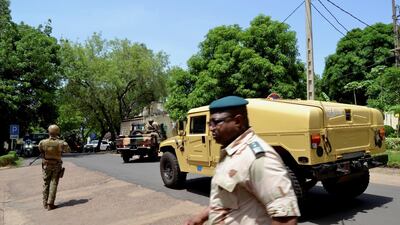Mali's transitional president and prime minister will eventually be released from detention after resigning in the presence of international arbitrators who are in the West African nation to mediate the political crisis.
The resignation by the leader of an 18-month civilian transitional government risks plunging the troubled nation into further instability.
The UN Security Council indicated on Wednesday after a closed meeting that the resignations were forced and demanded an immediate resumption of the civilian-led transition and return of the military to their barracks.
The world body, along with the African Union and other international bodies, as well as the US, urged Mali's military to release the transitional leaders.
The leader of the 2020 coup in Mali, Col Assimi Goita, who has been serving as the transitional vice president since September, regained control of the West African country by deposing the president and prime minister in a surprise move. President Bah N'Daw and Prime Minister Moctar Ouane were arrested on Monday, with other government leaders, hours after naming a new Cabinet that did not include two major former junta leaders.
While in detention, Mr N’Daw dismissed the prime minister before handing in his own resignation letter, according to a military official and a West African diplomat involved in mediations.
Maj Baba Cisse, the special adviser to Col Goita, who led the arrests on Monday that sparked international condemnation, said the resignations by the prime minister and president were done in the presence of arbitrators and offered assurances the leaders would eventually be released.
"After the resignation of the transitional president and his prime minister, the detainees will recover their freedoms. This will be done gradually for the obvious security reasons," he said.
The UN Security Council met on Wednesday over Mali and in a statement condemned the arrests and called for the immediate and unconditional release of all the officials detained.
The statement, which was approved by all 15 council members after closed consultations, said that “imposing a change of transitional leadership by force, including through forced resignations, is unacceptable”.
The Security Council reiterated its strong support for mediation efforts by the African Union and West African regional group, known as Ecowas, led by former Nigerian president Goodluck Jonathan.

French President Emmanuel Macron described the week's events as a coup and warned of repercussions, including sanctions.
The European Union also said that it is "ready to consider targeted measures against political and military leaders who obstruct the Malian transition".
The US strongly condemned the detention of the civilian leaders, with the State Department saying it would be suspending security assistance to the Malian forces.
"The United States will also consider targeted measures against political and military leaders who impede Mali's civilian-led transition to democratic governance," State Department spokesman Ned Price said.
When Col Goita released a statement Tuesday, he pledged to move forward with elections in 2022 as previously promised. But his display of force raises fears that there could be further significant interference by the junta that overthrew the last democratically elected president.
The new political unrest could further destabilise efforts to control a long-running insurgency in Mali. The UN now spends about $1.2 billion a year on a peacekeeping mission in Mali and France's military has spent eight years trying to stabilise its former colony amid the ongoing threat.

